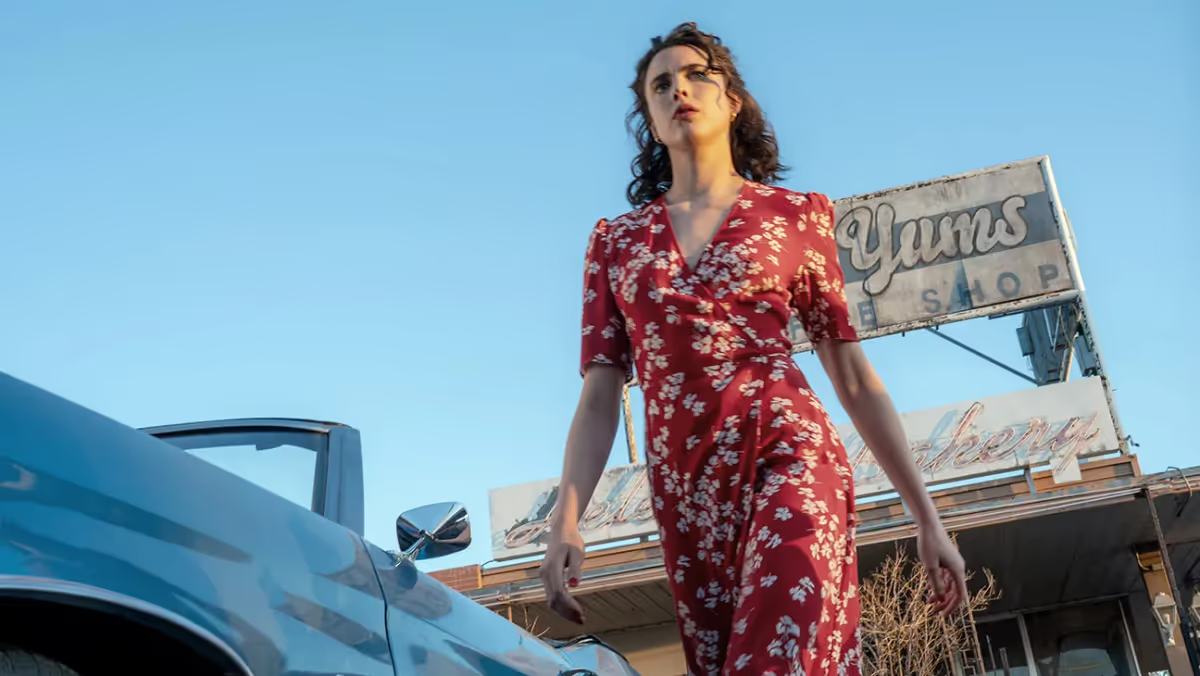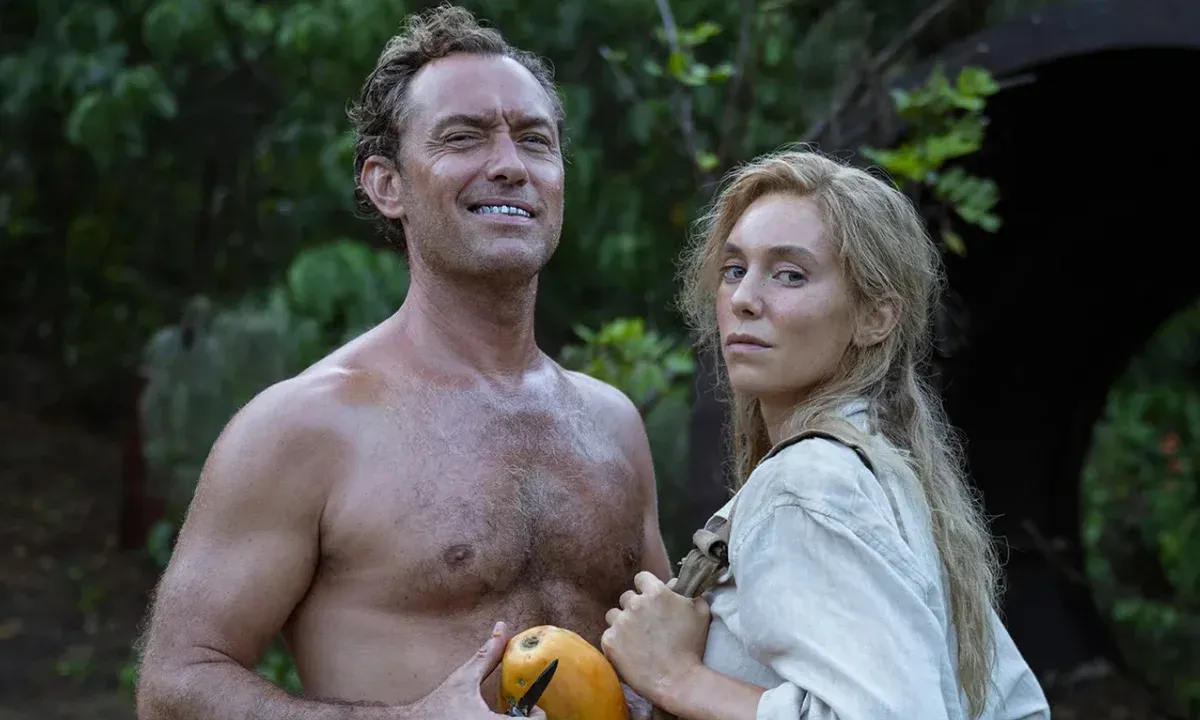In Review: 'Honey Don't!,' 'Eden'
An unusually hot August goes cold as two veteran filmmakers misfire.

Honey Don’t!
Dir. Ethan Coen
89 min.
The Coens show is on hiatus. The sibling partnership responsible for many great films across many genres and several decades, starting with 1984’s Blood Simple and pausing with 2018’s The Ballad of Buster Scruggs, has been cleaved for the time being. Uncle Tupelo is now Wilco and Son Volt. Pixies is now Frank Black and The Breeders. Not only do we have to consider what they’re like apart, but what their new work might say about what their individual strengths and priorities were as a duo. The early returns offered this skin-deep analysis: Joel Coen, who did a beautiful if ruthlessly austere black-and-white adaptation of The Tragedy of Macbeth, is “the serious one.” Ethan Coen, who has now made two zany comedies with his wife, Tricia Cooke, is “the funny one.” But now that we’re two films deep into Ethan and Cooke’s planned trilogy of “lesbian B-movies,” it’s tempting to shift a little more credit in his older brother’s direction. Because the Coens never made a film anywhere near as bad as Honey Don’t!
The warning signs were already present in last year’s Drive-Away Dolls, which has a fun shaggy-dog quality and a few sharp supporting performances (Bill Camp as “Curly”!) to counterbalance the determined wackiness that seems to radiate out of Margaret Qualley’s mannered schtick at its center. Qualley has mercifully dialed it back to play a queer private detective in Honey Don’t!, but Coen and Cooke amp up the volume around her with a supporting cast that nearly all overplay their roles. The Coen brothers always made comedies with a level of cartoonishness that were just restrained enough not to seem too sweaty, because the rhythm of the dialogue was reliably disciplined and snappy. Honey Don’t! crosses some invisible line that the Coens together were able to keep taut.
Of course, the looseness of Honey Don’t! is part of the intended fun, just as it was with Drive-Away Dolls. Working out of a crummy office in a run-down, sun-blighted corner of Bakersfield, California, Honey O’Donohue (Qualley) wears smart pantsuits and solves mysteries, the latest involving a client whose death in an auto accident strikes her as suspicious. Like many private eyes, Honey has a shaky relationship with the local police, including lusty detective Marty Metakawitch (Charlie Day), but she hits it off romantically with MG Falcone (Aubrey Plaza), who runs the evidence room. As their relationship heats up, so does the intrigue around the case, which leads to a major suspect in Reverend Drew Devlin (Chris Evans), a religious cult leader with strange sexual appetites, and the perhaps-related disappearance of her niece.
Much like Drive-Away Dolls, Honey Don’t! strives to be a low-stakes affair, a throwback to dimestore gumshoe paperbacks that reverses the underlying sexual energy from men to women. Whenever the film intermittently springs to life, it’s usually related to Coen and Cooke’s eagerness to give lesbian sex an explicit charge that’s usually reserved for hetero couplings in American films—and even those are in short supply. But Honey Don’t! feels perpetually a couple of drafts and a couple of takes from figuring itself out, leaving a film that’s larded up with red herrings and plagued by supporting performances that are rarely modulated. Perhaps a third go-around for Coen and Cooke will find that silly, subversive groove they’ve been attempting, but so far, they’re making an argument against side projects. — Scott Tobias
Honey Don't! opens in theaters everywhere tonight.


Eden
Dir. Ron Howard
129 min.
It’s a pretty bad sign for a movie’s characters when the opening text sets up a story about an attempt to escape the corruption of the world by starting anew on a desert island as being “inspired by the accounts of those who survived.” Eden, a new film directed by Ron Howard from a script by Noah Pink, doesn’t even bother with the rise-and-fall arc that might be expected of such a tale. Set on Floreana, an island in the Galápagos Archipelago favored by whalers and pirates in the 19th century, Eden recounts the true story of a group of Europeans who attempted to make their home there at the end of the 1920s. But the title is ironic from the start. Floreana is depicted as a dirty and dangerous place from the film’s first moments and only gets worse, and weirder, from there.
The film opens with the arrival of Heinz (Daniel Brühl) and Margret Wittmer (Sydney Sweeney), a German couple who travel to Floreana with Harry (Jonathan Tittel), Heinz’s son from a previous marriage, in an effort to escape their troubled homeland. They’ve been drawn there by the story of Friedrich Ritter (Jude Law) and his partner Dora Strauch (Vanessa Kirby), whose dispatches from Floreana have made them newspaper fixtures. Dora hopes the new environment will cure her multiple sclerosis. Ritter’s hard at work on a philosophical treatise with no less a goal than inspiring the rise of true democracy based on “the mind” and consequently “save humanity from itself.”
Upon arrival, the Wittmers find neither project is progressing as planned. What’s more, Friedrich and Dora don’t really want anyone to join them on Floreana. At best, they seem unwelcoming. At worst, they appear to be actively working against the Wittmers’ survival. Further complicating matters: the arrival of the Baroness Eloise Bosquet de Wagner Wehrhorn (Ana de Armas)—the title may be self-bestowed—and a pair of lovers she claims are there to help her build the world’s most luxurious hotel.
The “inspired by the accounts of those who survived” label proves to be even more important than it seems at first. Without giving too much away, not everyone makes it off the island and the real-life inspirations who did find their way back to civilization brought different accounts of what happened on Floreana, specifically who did what to whom and why. As imagined by Howard, life on Floreana often resembles an episode of Survivor if the contestants quoted Schopenhauer and Nietzsche and opted to remove their own teeth rather than seek professional help. Factions form, loyalties shift, and players have to deal both with an inhospitable environment and neighbors who probably don’t have their best interests in mind.
Shot with stark beauty by Mathias Herndl, Eden offers enough twists and robust performances that it never becomes boring. But it’s also frustratingly superficial. What drives a man to travel to the remotest spot on Earth to compose his thoughts? We don’t learn much more than the image of Law’s grimacing face hunched over a typewriter can tell us. De Armas at least seems to be attempting to find some untapped camp potential in the material but the tone is otherwise seemingly alien to Howard, who stages a scene of a character giving birth while simultaneously fending off a pack of wild dogs with a sense of high seriousness that the movie never earns. A scene like that is only dramatic if you’re given a reason to root for one outcome over another, even when one possibility might involve a baby becoming dog food. On Floreana, life is nasty, brutish and short, but who cares? —Keith Phipps
Eden arrives in theaters tonight.


Discussion